Pediasure and Pedialyte – These are two brands you’ve probably heard of many times, and you may believe that they are the same product or at least related in some way. However, that’s not the case for Pediasure. As it turns out, Pediasure is different from the other one. They are two different things, to put it simply. They do come from the same creator, Abbott Laboratories, but they are entirely different beasts. Both products cannot be compared head to head as they are not competitors in the market. Interested to know more about these two products? Continue reading to understand the difference between Pedialyte and Pediasure.
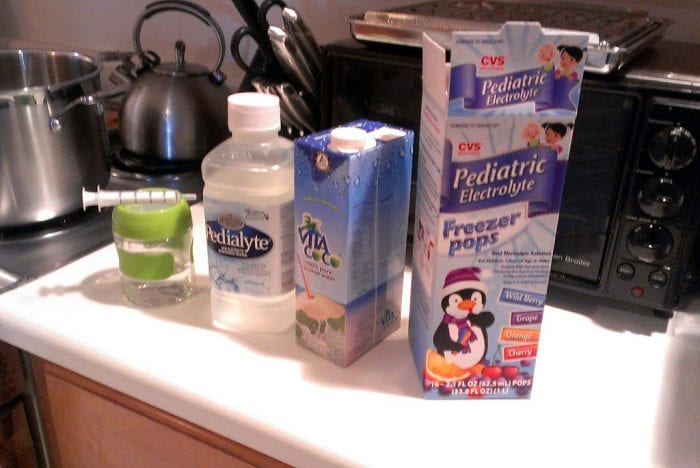
In this post, we’ll look at both Pedialyte vs Pediasure and tell you the differences.
Let Us Know Pedialyte More
Difference Between Pedialyte Freezer Pops and Pedialyte Powder
Pedialyte is an electrolyte drink that is marketed toward children and adults to help when they’re suffering from dehydration. It contains low sugar. It’s not a normal part of a child’s diet, but it’s used when you’re dealing with a fever or diarrhea–two conditions that cause dehydration.
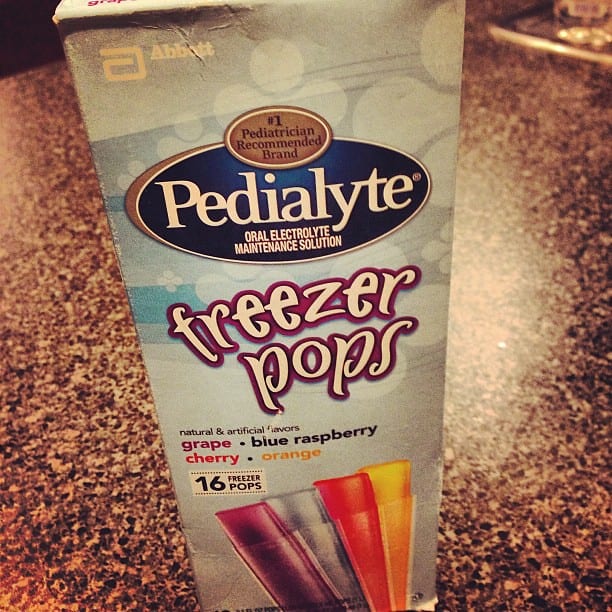
Classic Pedialyte comes in a liquid form, as well as a variety of flavors to taste, including an unflavored Pedialyte if your baby doesn’t like the taste of other variants. Besides, you can buy Pedialyte in other formats. For example, you can purchase Pedialyte freezer pops if you want a refreshing, hydrating treat. You can also make a DIY of your own by freezing your Pedialyte and turning it into freezer popsicle form. You can also buy Pedialyte powder packs that can be mixed with your sports drinks when you’re on the go.
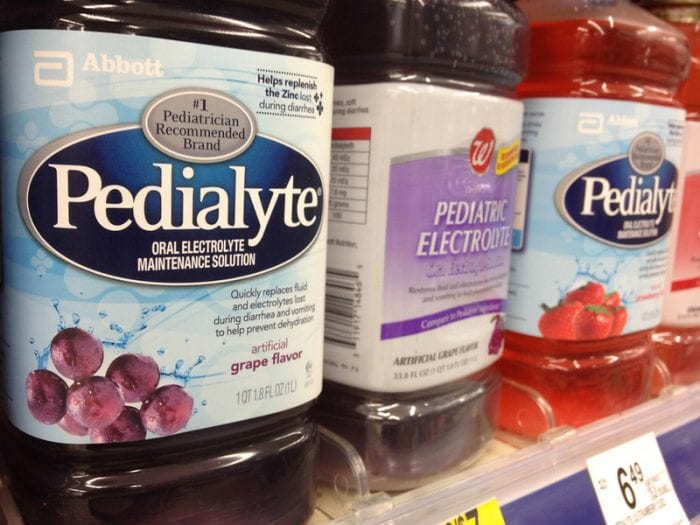
Pedialyte: Hangover Cure To Restore Nutritional Balance?
If you are experiencing a hangover, you may have heard about Pedialyte being an excellent hangover cure. Pedialyte is mainly a drink that an age group of people associate with children, but adults are wondering if Pedialyte is a unique way to prevent or treat hangovers.
There’s some truth to it. While it’s not a complete hangover cure, hangovers are typically caused by dehydration, electrolyte imbalance, nutritional supplements, and low blood sugar. That’s why people always tell you to stay hydrated if you want to do a night of drinking. Pedialyte can help in some regard to keep electrolyte balance, but if you’ve had too much to drink, it’s not going to cure your hangover magically. The best hangover cure is watching what you drink, even though that’s hard for many.
What is PediaSure?
Now, let’s look at Pediasure. It’s a gluten-free protein drink for children that contains various vitamins and minerals. For a growing child, especially a picky eater, Pediasure may be a good substitute for food if you want them to continue growing, plus the intake of vitamins for kids to gain weight. Many suggest consulting a doctor before giving your child Pediasure as an entire meal replacement or even a vitamin replacement here, though. There is a possible risk that you may experience especially when the content is good for adult people.
What Are Some PediaSure Nutritional Drink Products?
You can find various types of Pediasure products, each packed with vitamins and minerals. Let’s take a look at a few of them and see what they can generally do for your child.
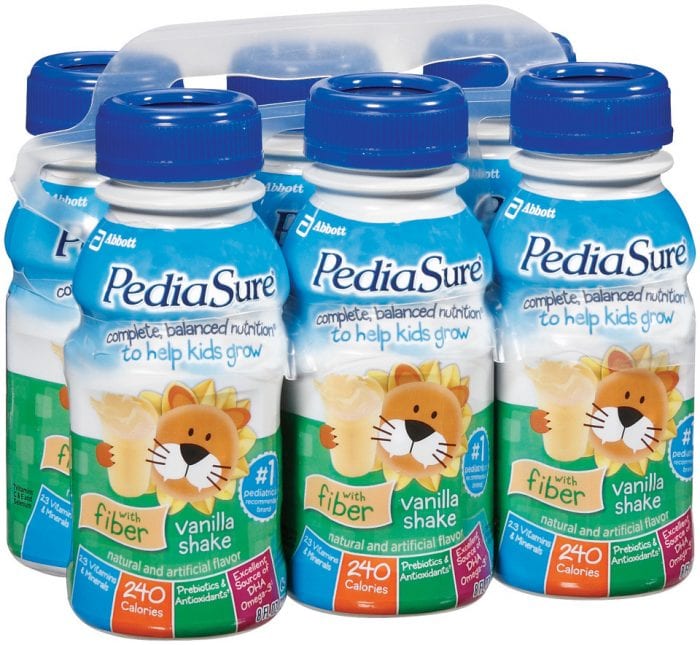
Pediasure Grow Gain
Pediasure Grow Gain is focused on child growth. It comes in a powdered form or as a premade drink, but the former is the cheaper option. Try Pediasure Grow Gain if you feel like your child can use a boost in growth.
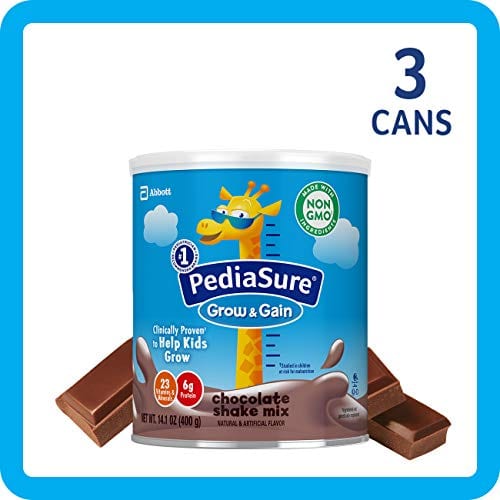
Pediasure Grow Gain With Fiber For Child’s Diet
An original Grow and Gain With Fiber, developed to address a crucial point in your child’s growth, has all the vitamins, minerals, and added fiber essential for your child’s nutritional needs to develop well. If your child is not getting enough fiber in their liquid diet, the PediaSure Grow Gain with Fiber has you covered. Here’s more about this PediaSure premade drink designed to support their development in a comprehensive manner.:
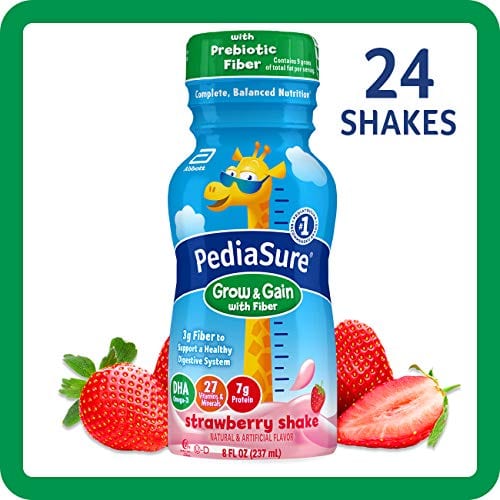
PediaSure Sidekicks: PediaSure Nutrition Facts
Pediasure Sidekicks have more protein and fewer calories and carbohydrates than other beverages. If you want to reduce the number of calories and carbohydrates your child consumes, Pediasure Sidekicks may be an excellent product to try. Here is more nutritional information about it.
- PediaSure SideKicks comes in 3 flavors: chocolate, strawberry, and vanilla.
- Pediasure SideKicks is also rich in Vitamins A, C, D, E, and K.
- PediaSure SideKicks is infused with calcium and vitamins B6 and B12.
- PediaSure SideKicks is completely gluten-free.
Does Pediasure Contain Lactose?
The answer is yes! However, the amount of lactose in Pediasure is too insignificant, so it is suitable even for kids with lactose intolerance.
Does Your Kid Need Pediasure?
Pediasure may help your child grow, but some parents are a little concerned with its sugar amounts. Trying the lower-calorie Pediasure may help with that. With all that said, while it’s an impressive product, it isn’t a substitute for healthy eating. A Pediasure here and there will certainly help a child who is behind on the growth chart, but they should not be drinking it all the time. Always ask your doctor before giving your child a Pediasure diet.
We should mention that Pediasure also has DHA Omega-3. DHA Omega-3 is perfect for healthy brain development and for keeping your child mentally secure. Most foods that are high in DHA Omega-3, such as fish, can help with this.
Age Range Of Pedialyte And PediaSure
Both pedialyte vs Pediasure have different age targets.
Pedialyte is meant for babies as young as six weeks all the way to adulthood. As we have said, although Pedialyte is marketed toward children, many adults love it for its hangover-treating properties. From the baby carrier and car seat to the taxi carrying you home, Pedialyte has you covered.
Meanwhile, Pediasure is suitable for ages two to 13. Once your child reaches adolescence, its usefulness goes down a little bit. This isn’t to say that there isn’t any use for it at all, but during the teenage years, your child has access to better protein powders and supplements than adults.
Pedialyte and Pediasure. These two may sound similar, but they are different.
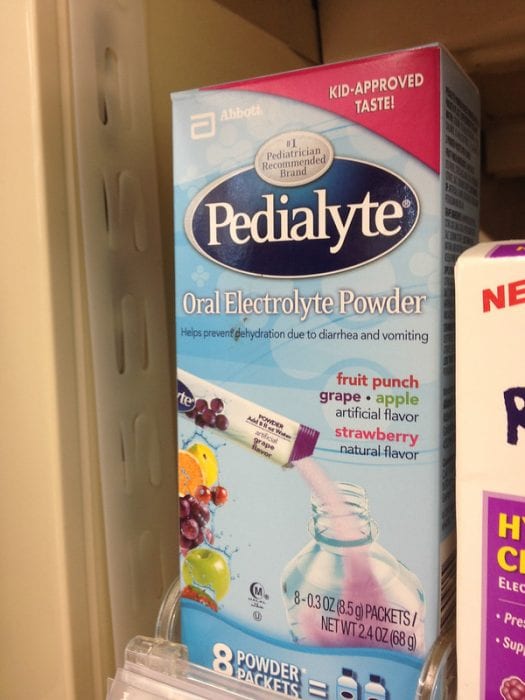
All About Abbott Nutrition (Pedialyte and PediaSure)
Pedialyte and PediaSure: two products come from Abbott Laboratories. Both of them contain valuable vitamins and minerals to help keep your body healthy. You can trust the company to help you nourish your child when you need it.
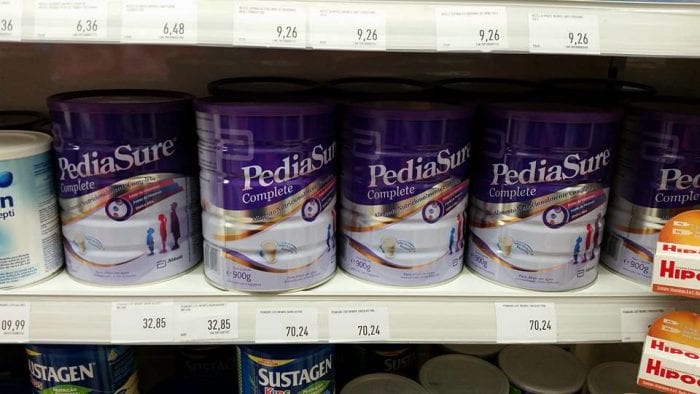
Conclusion
Pedialyte vs Pediasure: These are two products that have similar names, come from the same companies, but have different uses. They’re not something you can compare as they aren’t competing with each other.
Remember, the one and main difference between Pedialyte and Pediasure is that Pedialyte provides valuable vitamins and minerals to many children and adults. Pediasure is more of a growth nutritional supplement, and you can use this as a substitute that is suitable for lactose-intolerant children who need to gain weight and grow. They don’t have the same formula at all.
Pedialytee and Pediasure are also important to understand since they’re used for different reasons. Pedialyte, of course, contains sugar and electrolytes, which can help with the immune system of the body and provide hydration. You can mix Pedialyte with other drinks too, such as Gatorade and other drinks, to help provide valuable and useful results and give you hydration, which is possible for a child. Kids Grow PediaSure works with one intent—to give your child valuable vitamins and minerals to help kids grow. It is a good substitute for when they’re finally weaned off milk.
If you liked this post about Pedialyte and Pediasure, check out our other posts about the best baby products as well. You can find other related articles on various topics, including the best breast pump to use for bottle feeding, along with the best breast pump and baby monitor, here on our site, and you should be able to get all of the valuable information that you need to take care of your child and help it grow big and strong.
Frequently Asked Questions (FAQs)
Pedialyte: Is It OK For Kids?
Pedialyte contains a sufficient balance of sugar and minerals that helps to prevent dehydration during diarrhea and vomiting. Pediasure, on the other hand, has different qualities.
What’s Better Than Pedialyte?
If there’s a better alternative than Pedialyte, that would be Coconut water. Coconut water is full of fluid-balancing potassium and sodium that can give hydration to your child quickly and naturally.
Can You Mix Pedialyte And PediaSure Nutritional Supplements?
Pedialyte vs PediaSure are two different products designed for different purposes.
It is a nutritional supplement designed to provide balanced nutrition for children who may be undernourished, picky eaters, or are recovering from illness or surgery. It contains protein, vitamins, and minerals and is meant to supplement a child’s diet.
On the other hand, Pedialyte is an oral rehydration solution intended to treat dehydration, especially due to diarrhea, vomiting, or excessive sweating. It replenishes vital minerals and nutrients that have been lost due to these conditions.
Mixing the two is not typically recommended because they each serve distinct purposes and their individual compositions are balanced for those specific purposes. If mixed, it could lead to an excess intake of certain nutrients, potentially causing side effects. For example, consuming too much Pedialyte could lead to an imbalance of electrolytes, which could be harmful.
Before giving a child either of these products or combining them, it’s best to consult with a healthcare provider or pediatrician to ensure it’s appropriate for their specific needs. It’s generally better to focus on a balanced diet of whole foods and use these products as supplements only when necessary, as advised by a healthcare provider.
What Is The Alternative Nutritional Supplement To PediaSure?
There are several alternatives to this brand that can provide supplemental nutrition to children who need it. These can range from other brand-specific nutritional shakes to homemade options:
- Other Nutritional Shakes: There are other brand-name nutritional supplements available, such as Ensure (for older children and adults), Boost Kid Essentials, or Carnation Breakfast Essentials. Be sure to check the nutritional information for these products as sugar content and ingredient quality can vary.
- Homemade Smoothies: A homemade smoothie can be an excellent alternative to a nutritional shake. You can use a variety of fresh fruits, vegetables, proteins (like Greek yogurt or a plant-based protein powder), and healthy fats (like avocado or nut butter). This allows you to control the ingredients, making sure there are no artificial sweeteners or additives, and adjust the nutrients according to your child’s needs.
- Balanced Meals and Snacks: Focusing on balanced, nutrient-dense meals and snacks is the best way to ensure your child is getting the nutrition they need. This could include lean proteins (chicken, turkey, fish, beans), whole grains (brown rice, whole grain bread), plenty of fruits and vegetables, and healthy fats (avocado, nuts, olive oil).
- Multivitamin or Mineral Supplement: If your child is deficient in certain nutrients but eats a balanced diet overall, a pediatrician might recommend a specific vitamin or mineral supplement instead of a nutritional shake.
Always consult with a pediatrician or dietitian before introducing a supplement to your child’s diet, as they can provide guidance based on your child’s specific needs and overall health.
Pedialyte vs. PediaSure Comparison: What Is The Difference?
According to TheStorkList, Pedialyte is a drink that prevents dehydration in babies and children, especially after vomiting or diarrhea. Pediasure, on the other hand, is a nutritional drink that provides vitamins and protein.
PediaSure: Will It Help Kids Increase In Height?
Yes, PediaSure can help increase a child’s height, thanks to the 37 growth nutrients in the ingredients, as well as a triple protein complex. Pediasure is the best choice for increasing your child’s height and can be considered a delicious nutrition drink for their growth.
Pedialyte: What Are Its Side Effects To Toddlers, Older Children, And Adults?
In a Pedialyte and PediaSure comparison, Pedialyte side effects are more common. The kids experience dizziness, convulsions (seizures), fast heartbeat, high blood pressure, irritability, restlessness, muscle twitching, and swelling of the feet or lower legs.
PediaSure For Toddlers and Children: Does It Contain Milk?
Yes, PediaSure contains milk proteins such as milk and whey concentrate so it is a premade drink that can help children grow healthier and stronger, making it a part of their healthy diet. If you’re looking for more options aside from PediaSure, there are many that offer similar fruit flavors.
PediaSure For Children And Toddlers: Can It Increase Appetite And Help A Child To Eat More?
PediaSure is available to help fill in the nutritional gaps by boosting kids” appetites. While PediaSure isn’t one of the baby products to consider for a small child, it can also help with older toddlers.
Is Pedialyte Better Than Gatorade? Does It Help Toddlers, Kids, And Adults To Stay Hydrated?
Pedialyte serves as an oral rehydration solution for kids who are low in electrolytes, while Gatorade is an anti-dehydration drink that works better than water.
Are There Side Effects To PediaSure?
There can only be side effects if your child has a negative reaction to the proteins included in PediaSure such as milk and soy. If your child is experiencing diarrhea or constipation, then it’s better to stop giving PediaSure for it might do more harm in the long run, and switch to a similar formula.
What Can I Give My Child Instead of Pedialyte?
If your child is vomiting and experiencing diarrhea, more often than not, water is not the only best thing to give to your child. Water is not enough because all it can do is give hydration to your kid. You have to give them a drink that is rich in potassium and sodium, which can restore nutritional balance and replenish fluids.
What Is Healthier Than PediaSure?
It is a brand of nutritional shakes often given to children who are underweight, picky eaters, or those with nutritional deficiencies. However, it’s important to note that it is similar to other products and should not replace a healthy diet. Instead, they’re designed to supplement a child’s nutrition when it’s difficult to get them to eat a variety of food supplements or when they have specific nutritional needs.
If you’re looking for healthier alternatives, it’s advisable to focus on providing a balanced diet that includes a variety of foods:
- Whole Foods: Fresh fruits, vegetables, whole grains, lean proteins, and healthy fats are the foundations of a balanced diet. They are typically higher in fiber, lower in sugar, and more nutrient-dense compared to processed foods.
- Homemade Smoothies: These can be an excellent alternative to PediaSure. By using a mix of fruits, vegetables, proteins (like Greek yogurt, cottage cheese, or a scoop of protein powder), and healthy fats (like avocado, chia seeds, or flaxseeds), you can create a nutritious, balanced meal. You control the ingredients and can ensure there are no artificial sweeteners or preservatives.
- Protein-Rich Foods: Protein is essential for a child’s growth and development. Foods like chicken, turkey, fish, eggs, nuts, beans, and dairy products can provide high-quality protein.
- Healthy Fats: Avocados, nuts and seeds, olives, and fatty fish like salmon are excellent sources of healthy fats, which are essential for brain development.
- Hydrating with Water: Encouraging children to drink water instead of sugary drinks can help ensure they stay hydrated without consuming excess calories or sugars.
- Fiber-Rich Foods: Whole grains, fruits, vegetables, and legumes are high in fiber and can help promote a healthy digestive system.
Remember, every child is different, and nutritional needs can vary significantly from one child to another, especially if there are underlying health issues or allergies. It’s always a good idea to consult a pediatrician or a registered dietitian before making significant changes to a child’s diet.
Why Do Doctors Recommend PediaSure?
It is a nutrition supplement designed to help children who are at nutritional risk. It provides complete, balanced nutrition, which can help children who are not able to meet their nutrient needs through food diet alone. Here are some reasons why doctors might recommend PediaSure:
- Underweight Children: For children who are underweight, it can provide additional calories and nutrients needed for weight gain and growth.
- Picky Eaters: Some children are picky eaters and have a hard time consuming a balanced diet. It can help fill nutritional gaps in their diet.
- Illness Recovery: If a child has been ill, especially with conditions that cause poor appetite or increased nutrient needs, it can help ensure they’re getting adequate nutrition to recover.
- Children with Special Nutritional Needs: Certain health conditions, like cystic fibrosis, cancer, kidney disease, or gastrointestinal disorders, may increase a child’s nutrient needs or make it harder for them to eat enough. In these cases, it can be a useful tool to ensure they’re getting the nutrition they need.
- Meal and Snack Replacement: In busy families or those with limited food access, it can serve as a quick meal or snack that still provides essential nutrients.
However, it is not intended to replace meals and should not be the primary source of nutrition for a child, unless recommended by a healthcare provider. Whole foods should always be the first choice for providing balanced nutrition, and it should be used to supplement a child’s diet when necessary.
It’s important to consult with a pediatrician or registered dietitian before introducing it into a child’s diet, especially for long-term use. They can provide personalized advice based on the child’s age, growth, and overall health.
What Is The Disadvantage Of PediaSure?
While it is designed to provide balanced nutrition for children, especially those who may be struggling to meet their nutritional needs, it does come with potential drawbacks that should be considered:
- High Sugar Content: Contains a significant amount of added sugars. Consuming high amounts of sugar regularly can contribute to tooth decay, obesity, and other health problems.
- Processed Product: A processed food product, meaning it lacks some of the benefits that come from eating fresh, whole foods. For instance, whole foods usually provide more fiber and a broader range of nutrients than processed foods.
- Overreliance: There’s a risk that children and parents might start relying on it too heavily, using it to replace meals instead of complementing a balanced diet. This can potentially lead to an inadequate intake of whole foods and the diverse nutrients they provide.
- Cost: More expensive than many whole foods that could provide similar nutritional value.
- Taste Preference: Some children may develop a preference for the sweet taste of it, which could discourage them from eating less sweet but healthier food options.
- Nutrient Imbalance: If consumed excessively, without a proper balance of other foods, it could contribute to an imbalance of nutrients in a child’s diet.
As with any dietary supplement or nutritional product, it’s crucial to use it responsibly and as part of a balanced diet. It’s best to discuss its use with a healthcare provider or a registered dietitian to ensure it’s appropriate for your child’s specific needs.
Last Updated on May 7, 2023 by Bernadine Racoma
DISCLAIMER (IMPORTANT): This information (including all text, images, audio, or other formats on FamilyHype.com) is not intended to be a substitute for informed professional advice, diagnosis, endorsement or treatment. You should not take any action or avoid taking action without consulting a qualified professional. Always seek the advice of your physician or other qualified health provider with any questions about medical conditions. Do not disregard professional medical advice or delay seeking advice or treatment because of something you have read here a FamilyHype.com.